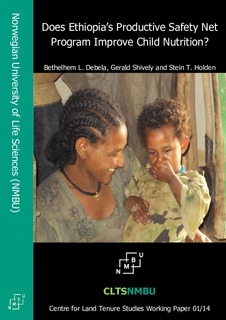Resource information
We study the link between Ethiopia’s Productive Safety Net Program (PSNP) and short-run nutrition outcomes among children age 5 years and younger. We use 2006 and 2010 survey data from Northern Ethiopia to estimate parameters of an exogenous switching regression. This allows us to measure the differential impacts of household characteristics on weight-for-height Z-score of children in member and non-member households in PSNP. We find that the magnitude and significance of household covariates differ in samples of children from PSNP and non-PSNP households. Controlling for a set of observable features of children and households we find that children in member households have weight-for-height Z-scores that are 0.55 points higher than those of children in non-member households. We conclude that the PSNP is providing positive short-term nutritional benefits for children, especially in those households that are able to leverage underemployed female labor.
NORAD


